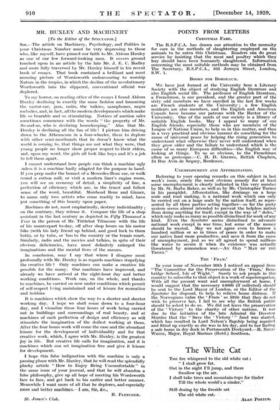MR. HUXLEY AND MACHINERY
[To the Editor of the SPECTATOR.] SIR,—The article on Machinery, Psychology, and Politics in your Christmas Number must be very depressing to those who, like myself, have pinned our faith to Mr. Aldous Huxley as one of our few forward-looking men. It covers ground touched upon in an article by the late Mr. J. E. C. Bodley and more fully traversed by Mr. Huxley himself in his recent book of essays. That book contained a brilliant and most amusing picture of Wordsworth endeavouring to worship Nature in the tropics, in which the decline of the revolutionary Wordsworth into the slippered, conventional official was deplored.
To my horror, on reading other of the essays I found Aldous Huxley declining in exactly the same fashion and lamenting the motor-car, jazz, radio, the talkies, saxophones, negro melodies, and, in fact, all the modern developments which make life so bearable and so stimulating. Notices of auction sales sometimes commence with the words " the property of Mr. So-and-so, who is declining housekeeping." Alas that Mr. Huxley is declining all the fun of life ! I picture him driving down to the Athenaeum in a four-wheeler, there to deplore with other semi-moribunds that he doesn't know what the world is coming to, that things are not what they were, that young people no longer show proper respect to their elders, and, upon my word, the girls all look like boys and it's a job to tell them apart.
I cannot understand how people can think a machine ugly unless it is a machine badly adapted for the purpose in hand.
If you peep under the bonnet of a Mercedes-Benz car, or walk round a cotton mill, or visit a modern liner's engine room, you will see an economy of detail, a simplicity of line, a perfection of efficiency which are, in the truest and fullest sense of the word, beautiful. Muirhead Bone and Ginner, to name only two artists who come readily to mind, have put something of this beauty upon paper.
Machines do not, most emphatically, destroy individuality ;
on the contrary, they release it. Compare the life of a shop assistant in the last century as depicted in Fifty Thousand a Year in the person of Mr. Tittlebat Titmouse with the life of his counterpart to-day, off after shop hours on his motor bike (with his lady friend up behind, and good luck to them both), or by tube, or 'bus to the country or the tennis court. Similarly, radio and the movies and talkies, in spite of their obvious deficiencies, have most definitely enlarged the imaginations and the mental lives of the masses.
In conclusion, may I say that where I disagree most
profoundly with Mr. Huxley is as regards machines stupefying the creative life ? Only machines can make a creative life possible for the many. Our machines have improved, and already we have arrived at the eight-hour day and better working conditions. Work can, on the whole, and thanks to machines, be carried on now under conditions which permit of self-respect being maintained and of leisure for recreation and hobbies.
It is machines which show the way. to a shorter and shorter working day. I hope we shall come down to a four-hour day, and I visualize those four hours of work being carried out in buildings and surroundings of real beauty, and at machines of such perfection of design and efficiency as will stimulate the imagination of the dullest working at them. After the four hours work will come the ease and the abundant leisure for the development of individuality and for that creative work, which, I agree with Mr. Huxley, is the greatest joy in life. But creative life calls for imagination, and it is machines which can set imagination free and give it leisure for development.
I hope this false indignation with the machine is only a
passing phase with Mr. Huxley, that he will read the splendidly plucky article " How to Enjoy Being Uncomfortable" in the same issue of your journal, and that he will abandon a false philosophy, give up all hope of meeting his Wordsworth face to face, and get back to his earlier and better manner. Meanwhile I want more of all that he deplores, and especially
more and better machines.—I am, Sir, Sm.,
St. James's Club. R. FLETCHER.












































 Previous page
Previous page